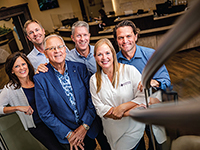
“We were told early on that you can have either a successful family or a successful business,” says Kari Nelson, a member of the second generation of ownership of Glenwood State Bank. “To have both is really hard.” With that in mind, she and her siblings said to each other, “Times are good. Let’s have some of those hard conversations now and get things in place in this generation.” And, she adds, for the generations to follow.
The Glenwood State Bank family took this step not just for themselves. They also knew how fundamental the bank is to their community’s economy, helping launch and sustain numerous local businesses in central Minnesota. Glenwood is located about 120 miles northwest of the Twin Cities.
Starting in about 2006, family members began to establish a formal plan for working together. Kari Nelson’s generation includes her husband, Peter Nelson, a CPA who is now the bank’s president; her sister, Kirsten Nelson (yes, she also married a man surnamed Nelson), who is a vice president coordinating the bank’s philanthropic activities and various other bank projects; and their brother, Paul Martinson, the bank’s chief credit officer. Kari Nelson is also a vice president, overseeing HR.
The family patriarch, Dennis Martinson, was hired as a teller at Glenwood State Bank in 1959 after graduating from high school. At age 29, he purchased the bank with a couple of older partners, whom he later bought out. Now board chair at age 80, Martinson describes himself as “semi-plus-plus-plus-retired” and a “resource to generation two.”
Working with the Family-Held Bank Institute, the family developed a multifaceted plan designed to develop a strategic direction and handle potential conflict. During his career, Martinson has seen that “business-owning families’ lack of communication can destroy a family relationship.” The family holds retreats once or twice a year, where members hash out strategy and planning. They also meet frequently at the bank, with a prepared agenda.
There isn’t always agreement on every point, at least not at first. But the family makes a point to get on board with every final decision. Once an issue is settled, “you forget who ‘owns’ the original idea,” Kirsten Nelson says. “It just becomes the decision, and we all agree.” Peter Nelson notes that when it comes to day-to-day operations, “we respect each other’s decisions in our area of authority,” whether that’s credit, hiring, or overall management.
One tie that binds all family members is a strong sense of values—and the value their bank adds to their community. That includes helping build local businesses.
In 1961, metal manufacturing firm Clyde Machines was a tiny startup. Glenwood State Bank provided financing to spur the growth of the company, which manufactures airline equipment including baggage carts and trailers. “I don’t have to call an 800 number and press a bunch of numbers to get to a human,” says president Chad Barsness, the company founder’s grandson. “I can always get an answer to any question I have.”
A few years ago, Clyde Machines undertook a 100,000-square-foot, $7 million expansion. “They didn’t bat an eye at helping us finance that,” Barsness says. “It went smoothly, and it has been working out fantastically.”
Glenwood State Bank wants to maintain that sense of approachability, even as it continues to grow. In the past 20 years, it has acquired Lowry State Bank and the First National Bank of Osakis, located in their eponymous cities near Glenwood. In both cases, Peter Nelson says, the owners approached Glenwood State Bank “because our values aligned, and they knew we’d do the best job in taking care of their customers, their communities, and their employees.”
It’s a little early to discuss succession: Only one member of the third generation is older than 21. “We do have some requirements for the kids in order to come back and work at the bank,” Kari Nelson says. Those include earning a college degree and gaining outside work experience, meant to provide them with a different perspective that can be useful to both them and the bank. “It’s also a way for them to come in and earn the respect of their peers,” she says; a position won’t simply be handed to them.
She also says that her generation seeks to impart “the importance of hard work and of serving the community.” Her family and the bank are involved in numerous philanthropic activities, and the next generation is expected to continue those. Though work must often come first, there also can be a “nice balance, and this is a good quality of life” in Glenwood.
“We hope we’re giving the next generation the opportunity to feel how awesome it is to give back and to be selfless and have an impact on someone else,” Peter Nelson says. That doesn’t mean that they have to work at the bank. But “we hope that they can see that banking is an amazing industry [that] has a real impact on people’s lives and helps them make their dreams come true.”









